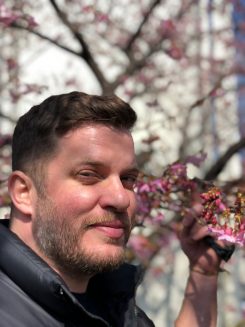Interview with David R. Anderson

SDS455: Sexuality and Health will be taught by David R. Anderson this year. We spoke with him about his approach to the subject in anticipation of the winter term.
- We had a successful inaugural offering of this course last year. As a new instructor to this course, what can students expect this year?
As my background is in disability studies and environmental studies, particularly queer ecologies, students can expect to delve deeply together into these areas as we explore a variety of intersections of sexuality, health, and ethics. As opposed to more standard courses devoted to topics in public health and medicine, students can expect unexpected and rich conversations across a variety of fields of scholarship. As a 4th year course, we will engage contemporary scholarship in a seminar-style format in order to consider, from a cultural studies approach, what motivations, ideologies, and investments lie behind terms like “health,” “cure,” “rehabilitation,” and “medicine.” Along the way we will encounter, for example, blind children, horse urine and menopausal women, “restored” grass lands, and their multiple biopolitical entanglements.
- What is your background with the material and what do you bring to the course?
My educational background is in literature, sexuality studies, disability studies, and environmental studies. From these fields I bring an approach that prioritizes embodiment, ecological relationships, queer perspectives, and practices of close reading. My lifelong experience of legal blindness also brings an extra layer to my teaching (we will, for example, likely end up discussing the important differences and understandings of “health” between blind camp, scout camp, and queer camp!). Buckle your seat belts and bring your sun glasses!
- How will a course on sexuality and health impact undergraduate students and why do you think it’s important to teach this course now?
The Conservatives’ recent and petty clawing back of progressive sex education programming across the province clearly demonstrates the deep and vital need for robust conversations concerning health, sexuality and ethics. As secondary students themselves have stated, turning back the clock of sex education to the 1990s puts all youth in danger, most especially young women, racial, sexual and gender minorities, and all students whose lives are vulnerable to STI and HIV infection and sexual violence. Those who experience racialized, gendered, and sexualized violence depend upon systems of health which are, sadly, often steeped in the moral stigmatization society attaches to sexual violence and the transmission of STIs and HIV. Students can expect a lively engagement and questioning of their own and society’s understandings of “health” and our ethical commitments to those especially vulnerable to such stigmas. This course will be a benefit to students from many fields, but especially SDS students and those interested in public health, medicine, ecology and the environment, and disability studies.

